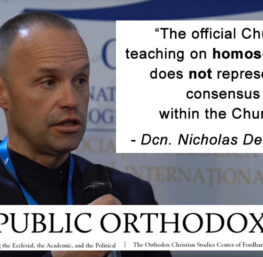OrthodoxyToday | Jonathan Price | June 2009
Environmental activists want us to change our lifestyle to save the planet. We must drive less, fly less, eat less meat, and take fewer baths. Green political parties and activist groups such as Greenpeace design policies to stimulate green choices, and to tax polluting ones. Bookshops are full of cheerful little guides which tell us how to reduce our carbon footprints by growing our own vegetables, using shampoo but not conditioner, and going on one long holiday instead of several sort ones.
Yet amidst all this detailed advice, these green knights remain silent on two of the most important ecological catastrophes: the explosive growth in singles, and divorce. In other words, the decline of the bourgeois family both as cultural ideal and reality.
Singles use 40 to 60 percent more space, electricity, gas, water and other resources than the married, and they produce far more waste. After a divorce, the former spouses suddenly need two fridges, two washing machines, two flyswatters, and two toothbrushes. More singles means more cars, more houses, and smaller portions of precooked food packaged in more plastic.
The dramatic effects of single living on the environment seems to be common sense once it has been thought through, but it has also been extensively documented in scientific journals such as „Nature“. According to recent research from the University College London the modern single is „an ecological time-bomb“ not only compared to his married friends but also to the traditional widow or thrifty spinster. A publication of the American National Academy of Sciences states that in 2005 an extra 73 billion kilowatt-hours of electricity and 2400 billion litres of water were used in America as a consequence of divorce. To put this in green perspective, that’s nine times the total production of renewable electricity in Holland in the same year, and about three times the total water use of all Dutch households put together. All those windmills’ work negated by American divorce! Similar increases apply to waste production and use of space. And this is only the increase after divorce; the extra amount of resources used by all modern forms of singleness (compared to marriage and traditional singleness) is much, much higher.
It is therefore very bad news for Mother Earth that all over the world – from China to Colombia and South Africa to the USA – both the number of divorces and singles are growing quickly, and alongside them the increased use of limited resources. To make matters worse, in most countries divorce is becoming easier legally, and the traditional condemnation of it is declining. Singles now abound. Again to use the Dutch as an example, 48 percent of the dwellings in Amsterdam have only one person living in them. In Stockholm, it is 60 percent.
[…]
The dramatic effects of single living on the environment seems to be common sense once it has been thought through, but it has also been extensively documented in scientific journals such as „Nature“. According to recent research from the University College London the modern single is „an ecological time-bomb“ not only compared to his married friends but also to the traditional widow or thrifty spinster. A publication of the American National Academy of Sciences states that in 2005 an extra 73 billion kilowatt-hours of electricity and 2400 billion litres of water were used in America as a consequence of divorce. To put this in green perspective, that’s nine times the total production of renewable electricity in Holland in the same year, and about three times the total water use of all Dutch households put together. All those windmills’ work negated by American divorce! Similar increases apply to waste production and use of space. And this is only the increase after divorce; the extra amount of resources used by all modern forms of singleness (compared to marriage and traditional singleness) is much, much higher.
It is therefore very bad news for Mother Earth that all over the world – from China to Colombia and South Africa to the USA – both the number of divorces and singles are growing quickly, and alongside them the increased use of limited resources. To make matters worse, in most countries divorce is becoming easier legally, and the traditional condemnation of it is declining. Singles now abound. Again to use the Dutch as an example, 48 percent of the dwellings in Amsterdam have only one person living in them. In Stockholm, it is 60 percent.
. . . more



